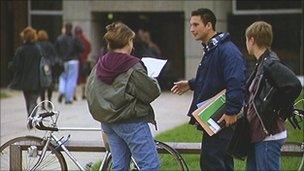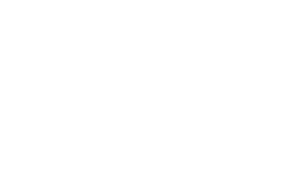Student satisfaction rate stalls at 82%, survey finds
- Published

Students were asked about every aspect of their university experience for the NSS
UK students' satisfaction with their undergraduate courses has stalled, the National Student Survey has found.
Overall, 82% of finalists at UK universities in 2010 were satisfied with the quality of their course, the same percentage as last year.
Universities warn satisfaction ratings could deteriorate as funding cuts bite.
The NSS, in which 252,000 students took part, is published by the Higher Education Funding Council for England (Hefce) to help maintain standards.
"The survey provides vital information to inform young people's choices and helps universities and colleges maintain learning and teaching that meets their students' needs," Hefce chief executive Sir Alan Langlands said.
Students are asked about every aspect of their university experience, including questions on teaching, assessment, support and resources.
This year's survey found 81% of students in England were satisfied with their course, the same percentage as last year.
Students at Buckingham University, a private institution, were happiest with their course, giving an overall rating of 95%.
The Open University (registered as an English institution), Oxford University and Medway School of Pharmacy received top overall satisfaction ratings of 93%. A total of 91% of students taught at Cambridge University were happy with their courses.
In Scotland the overall satisfaction rate was 86%, the same as in 2009. St Andrew's University was given the top satisfaction rating of 93%.
The overall satisfaction rate for students in Wales was 82%, down from 83% in 2009. Aberystwyth University got the highest satisfaction rating of 92%.
And in Northern Ireland the overall satisfaction rate for undergraduates was 83%, down from 84% last year. St Mary's University College was given the top satisfaction score of 94%.
'Punitive cuts'
But universities warn that tighter budgets ahead will make it harder for them to ensure high student-staff ratios and good quality resources in the future.
Funding levels will be revealed in the Comprehensive Spending Review in the autumn, but ministers have said departments could face budget cuts of up to 25%.

David Willetts says the survey gives prospective students information
Labour had hugely expanded spending on higher education until its last year in office, when it cut the projected budget for universities in England for the academic year 2010-11 by £449m.
An independent review of university fees and funding is being carried out by the former BP chief executive, Lord Browne, and is expected to report back in the autumn.
The director general of the Russell Group, which represents 20 leading universities, said that despite the "challenging funding environment", its members had provided students with an overwhelmingly positive experience.
"However, Russell Group universities are finding it increasingly difficult to maintain a high quality learning environment and high student satisfaction rates, particularly in light of the past year's spending cuts," Dr Wendy Piatt said.
"Any further cuts would severely impede efforts to drive up quality of teaching and research."
"It is essential that the government enables universities to access more funds - by lifting fee caps after the Browne review - so they can concentrate on providing a world-class learning experience," she added.
The general secretary of the University and College Union (UCU), which represents lecturers and academics, said: "What the coalition government needs to quickly understand is that you cannot make the kinds of cuts it is planning and expect no consequences.
"If the coalition government pushes ahead with its punitive cuts agenda, we will see teachers on the dole, students in larger classes and a higher education sector unable to contribute as much to the economy or society," Sally Hunt added.
'Wake-up call'
The National Union of Students (NUS) said the survey showed university vice-chancellors had failed to improve the student experience in England despite tripling tuition fees.
NUS president Aaron Porter said: "This year's National Student Survey is a wake-up call to university vice-chancellors. They must buck up their ideas and do far more to improve the experience they offer students."
Universities UK chief executive Nicola Dandridge said: "Clearly, there is more to be done and student feedback has a vital role to play."
Universities Minister David Willetts said: "This latest National Student Survey tells a broadly positive story about our universities.
"I want to ensure prospective students have comprehensive, up-to-date and comparable information about what is on offer."
The results of the NSS are published on the Unistats, external website.